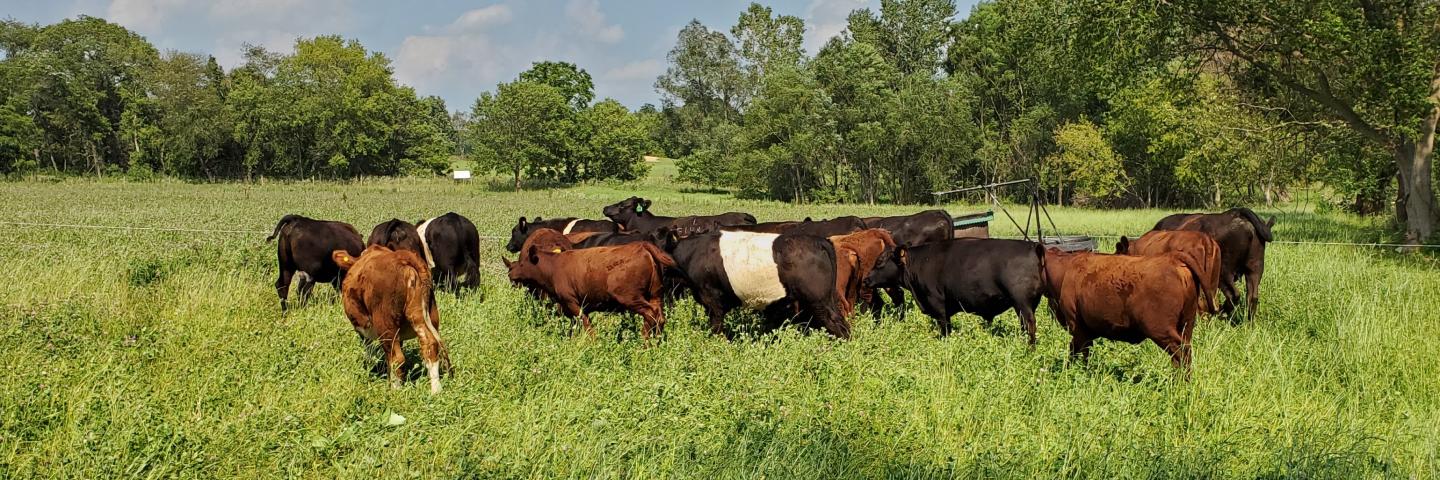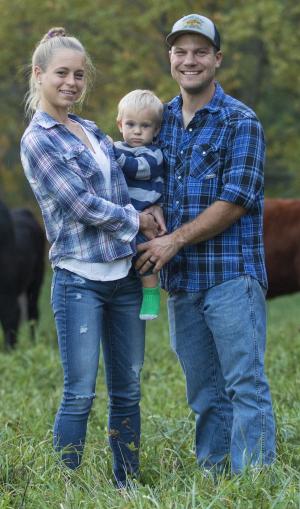
Meet Joe & Hannah Wanda from Harvard, IL. Farming so close to Chicago, their grass-fed options are in high demand & their soils are protected & healthy.
JOE & HANNAH WANDA
Wanda Family Farm-Harvard, IL
Overview
Joe Wanda is a first-generation farmer. Growing up in northern Illinois, he took an early interest in livestock, working on a neighboring dairy farm. He went to school for agriculture and continued to work in the dairy industry after graduating. Joe eventually left dairy and returned to the family auto business, but as he learned more about regenerative agriculture and grazing, he realized it was the right fit for him, his family, and the industry more broadly.

Joe and his wife Hannah started their own farm on 27 acres of Joe’s parents’ property, purchasing the 77 acres that became Wanda Family Farm in 2018. Part of the initial support for the farm came from the Natural Resources Conservation Service (NRCS) Environmental Quality Incentives Program (EQIP). Joe applied for cost share through EQIP, and received funds to convert 12 acres to pasture, which included installation of fence and water lines and seeding pasture. As Wanda Farm continues to grow, Joe and Hannah are committed to converting the rest of the farm’s tillable acres to pasture.
Growing the Business
Wanda Farm has scaled rapidly. In 2019, Joe and Hannah provided food to around 25 families. By 2021, that number had grown to 300. Their goal is to scale to feed 1200 families by the end of 2023. Hannah left her off-farm job in the fall of 2021 to spend more time building the operation. Joe continues to work for the family’s automotive business but eventually hopes to work on the farm full time as well.
The Wandas began by selling quarters and halves of beef and pork. They’ve since expanded to include poultry: customers can now purchase grass-fed, grass-finished beef products; pastured pork; pastured chicken; and eggs. In 2019, Wanda Family Farm launched their website and online marketplace.
Initially, online purchasing was just for local delivery and farm pick up, but Joe and Hannah now ship product across the eastern U.S. They also created a self-serve farm store in 2021, where customers can stop in and purchase meat directly.
Demand is high for Wanda Farm products; Joe started buying meat from other local producers after his operation alone could no longer meet consumer interest. Joe has sold to some restaurants in the past but notes that restaurant sales typically have lower margins and require additional time to coordinate. The direct-to-consumer model is the clear fit for Wanda Farm, and Joe plans to grow shipping through word of mouth and paid advertising, eventually moving product nationwide.
Because of its proximity to Chicago and the resulting land costs, the price point for Wanda Farm products is higher than farms farther from the city. But Joe says that because of the trust he and Hannah have built with customers and the transparent way they manage the business, their clientele readily pays higher prices.
Finding and securing processing is a persistent challenge, but over the last several years Joe has built good relationships with a number of processors in the region.
It Starts with Soil
Joe considers his livestock to be tools to build soil health. The livestock of Wanda Farm are rotated frequently through polywire paddocks, which creates an even distribution of manure and fertility across the pastures. Carefully managing fertility in this way increases soil organic matter, enhancing forage quality, and improving the nutrient density and taste of the final product. Raising livestock on grass has also eliminated the need for antibiotics and hormones.

Joe notes that there is significant consumer confusion about labeling. Beef labeled as grass-fed is still often finished on grain, and the organic label only means that livestock were fed organic feed, which typically includes grain. As Joe says, the best way to ensure your meat is “as advertised” is to know your farmer.
Regeneration is the Future
Joe sees regenerative farming as the future: “We’re all realizing that if we don’t farm regeneratively, our food and climate crisis will get worse. We’re doing this because it’s the right thing to do… We’re in the beginning of a revolutionary phase of farming.”
Joe also notes the significant resources from government agencies and non-profits for beginning farmers. He regularly receives communications with funding and training opportunities for aspiring regenerative producers. The biggest issue, from his perspective, is consumer education. Consumers drive demand for regeneratively produced products, but without education on the various benefits of these products may be unwilling to pay the higher price point.
Consumer education is therefore a core component of Wanda Farm’s business model. Joe and Hannah launched a YouTube channel to share more about why and how they farm, and plan to start a podcast. Joe hopes that with greater demand, farmers will continue to shift to regenerative practices.
To learn more about Wanda Family Farm, visit their website and check out their Facebook page and YouTube channel.

